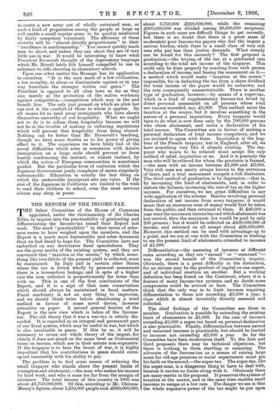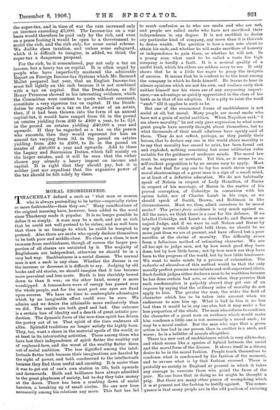THE REFORM OF THE INCOME-TAX. T HE Select Committee of the
House of Commons appointed, under the chairmanship of Sir Charles Dilke, to inquire into the practicability of graduating and differentiating the Income-tax issued their Report last week. The word " practicability" in their terms of refer- ence seems to have weighed upon the members, and the Report is a much more businesslike and sober document than we had dared to hope for. The Committee have not embarked on any doctrinaire fiscal speculations. They see the great merits of the existing system, and they are convinced that "taxation at the source," by which some- thing like two-thirds of the present yield is collected, must be maintained. In Italy and in certain other States where the tax is levied wholly by personal assessment there is a tremendous leakage, and in spite of a higher rate the sum collected. is proportionately far lower than with us. This is one of the first conclusions of the Report, and it is a sign of that sane conservatism which should always be maintained in fiscal matters. Fiscal machinery is not an easy thing to improvise, and we should think twice before abandoning a tried method in favour of some novel device, however attractive on paper. A second general feature of the Report is the new view which is taken of the Income- tax. The old theory that it was a war-tax is utterly dis- carded. It is regarded as an integral and permanent part of our fiscal system, which may be useful in war, but which is also invaluable in peace. If this be so, it will be necessary to revise our whole theory of the impost, for clearly it does not stand on the same level as Continental taxes on income, which are in their nature non-expansive. If the taxpayer is to bear the brunt of war, it is highly important that his contributions in peace should corre- spond reasonably with his ability to pay.
The problem is to find some means of relieving the small taxpayer who stands above the present limits of exemption and abatement,—the man who makes his income by hard work, and who is none too far from the margin of existence. The total income of this country in 1906 was about £1,750,000,000. Of this, according to Mr. Chiozza- Money's figures, about 1,250,000 people took £600,000,000, about 3,750,000 £250,000,000, while the remaining £900,000,000 was divided among 39,000,000 recipients. Figures in such cases are difficult things to get correctly, but there is no doubt that there is a great mass of moderately poor Income-tax payers who feel the impost a serious burden, while there is a small class of very rich men who pay less than justice demands. What remedy can be found for this anomaly ? The first proposal is graduation,—the levying of the tax at a graduated rate according to the total net income of the taxpayer. This could only be done properly by exacting from each person a declaration of income, and basing the assessment on it,— a method which would make "taxation at the source" impossible, for in deducting the tax from a share dividend the total income of the payee would be unknown, and the rate consequently unascertainable. There is another type of graduation, however,—by means of a super-tax, which is a kind of supplementary Income-tax levied by direct personal assessment on all persons whose total net income exceeded, say, £5,000. This method saves the taxation at the source, but it involves something in the nature of a personal inquisition. Every taxpayer would have to do what is now done only by the 700,000 persons who claim abatement, and make a declaration of his total income. The Committee are in favour of making a personal declaration of total income compulsory, and we are inclined to agree with them. Inquisition is the bug- bear of the French taxpayer, but in England, after all, we have something very like it already existing. The tax- payer who wants to be relieved must accept the only method of relief, inquisition or no. And it is precisely the man who will be relieved for whom the provision is framed, —the man with an income between .21,000 and .23,000. 'Very rich men are nearly always known to the surveyors of taxes, and a trial assessment compels a full disclosure. The third method of graduation is by degression,—that is, by increasing the limit of abatements, and, in order to restore the balance, increasing the rate of tax on the higher incomes. For ourselves, we see great difficulties in any wide application of the scheme. Besides involving personal declaration of net income from every taxpayer, it would mean that an enormous sum of money would first be taken from the public, and then returned to them. If £40,000 a year were the maximum income beyond which abatement was not carried, then the maximum tax would be paid by only 250 persons ; but it would be collected on £450,000,000 of income, and returned on all except about £20,000,000. However, this method can be used with advantage up to a point, and we are at one with the Committee in wishing to see the present limit of abatements extended to incomes of £1,000.
Differentiation—the assessing of incomes at different rates according as they are " earned " or "unearned "- was the second branch of the Committee's inquiry. Obviously, there is a great difficulty in the distinction, for an income may be the product of capital on one aspect, and of individual exertion on another. But a working definition has been found on the Continent, where it is a feature of many Income-tax systems, and no doubt some compromise could be arrived at here. The Committee think that the only way is to limit incomes requiring differentiation to those not exceeding £3,000 a year, a class which is almost invariably directly assessed and collected.
The chief findings of the Committee are three in number. Graduation is possible by extending the existing limit of abatements to £1,000. In the case of incomes exceeding .R5,000 a super-tax based on personal declaration is also practicable. Finally, differentiation between earned and unearned incomes is practicable, but should be limited to incomes not exceeding .23,000 a year. So far the Committee have been moderation itself. To the first and third proposals there may be technical objections, but there is nothing in them startling or menacing. The advocate of the Income-tax as a means of raising large sums for old-age pensions or social experiments must pin his faith on the second,—the super-tax. The super-tax, like the super-man, is a dangerous thing to have to deal with, because it carries no limits along with it. Obviously there are many merits in the proposal. It preserves the system of taxation at the source, and at the same time enables small incomes to escape at a low rate. The danger we see is that the whole expansive power of the tax might be put upon the super-tax, and in time of war the rate increased only on incomes exceeding £5,000. The Income-tax on a war basis would therefore be paid only by the rich, and even on a peace footing it would be open to a Government to mulct the rich, and the rich only, for some social scheme. We dislike class taxation, and unless some safeguard, which it is difficult to imagine, is added, we think the super-tax a dangerous proposal.
For the rich, be it remembered, pay not only a tax on income, but a heavy tax on capital. It is often urged by people who have imperfectly mastered the admirable Report on Foreign Income-tax Systems which Mr. Bernard Mallet prepared last year, that an English Income-tax must fall lightly on the rich because it is not combined with a tax on capital. But the Death-duties, as Sir Henry Primrose showed in his interesting evidence, which the Committee were content to quote without comment, constitute a very rigorous tax on capital. If the Death. duties be regarded as a tax on the owner of an estate, then, if it had been thrown into the form of an annual capital-tax, it would have ranged from 6d. in the pound on estates yielding from £40 to ..P.,400 a year, to is. nd. in the pound on estates yielding .240,000 a year and upwards. If they be regarded as a tax on the person who succeeds, then they would represent for him an annual tax varying from 9d. in the pound on estates yielding from £40 to £400, to 2s. in the pound on estates of £40,000 a year and upwards. Add to these the Legacy and Succession Duties, which fall mainly on the larger estates, and it will be seen that the richer classes pay already a heavy impost on income and capital. It is right that they should pay, but it is neither just nor expedient that the expansive power of the tax should be felt solely by them.



























































 Previous page
Previous page